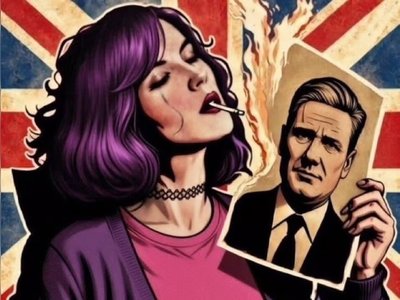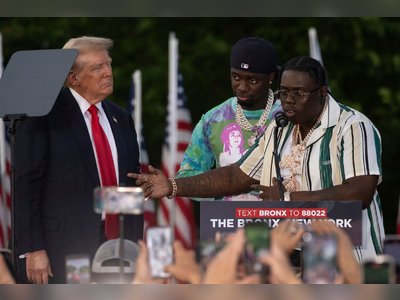
A TikTok Trend Sold Out Ozempic, Leaving People With Diabetes Dizzy, Scared
Ozempic, an injection that keeps blood sugar levels in check for patients with type 2 diabetes, has been in shortage for about four months, according to the database maintained by the US Food and Drug Administration.
For more than a month, Shane Anthony, a 57-year-old auto mechanic, hasn't been able to get his diabetes medication.
Ozempic, an injection that keeps blood sugar levels in check for patients with type 2 diabetes, has been in shortage for about four months, according to the database maintained by the US Food and Drug Administration, and is backordered at Anthony's Seattle pharmacy.
Without the Novo Nordisk A/S-made prescription, he has suffered recurring dizzy spells while repairing cars. Alternative medications are either out of stock or not covered by his insurance.
While increased demand and supply chain delays have left multiple medicines from the antibiotic amoxicillin to Adderall in short supply, the reason for a lack of certain diabetes drugs is unusual: doctors are prescribing them to non-diabetics who want to use them for weight loss.
"All these famous people, stars who don't need to lose weight, are going and getting it," Mr Anthony said. "I need it to stay healthy and not die."
For the more than 35 million people who live with type 2 diabetes, the shortages have added yet another layer to managing an already complicated and costly chronic illness. They've also exposed weaknesses in America's use of off-label prescribing, which allows physicians to hand out drugs to treat a different condition than the one for which they were officially approved. When those medications are hard to find because of celebrity and social-media hype, patients with diabetes suffer.
Ozempic, known generically as semaglutide, is one of a class of diabetes drugs known as GLP-1 receptor agonists that have been around for nearly two decades. It was first approved in the US in 2017 for use in those with type 2 diabetes. Ozempic mimics a hormone involved in appetite and eating, helping to stimulate insulin production and lower patients' blood glucose levels. It also often leads to them shedding pounds.
Francisco Prieto, a family physician in Sacramento, California, sees at least one person with diabetes per week who is having trouble filling their prescription for Ozempic. Patients will call multiple pharmacies and drive around town to see if it's in stock, but some still haven't been able to get it, said Mr Prieto, who also does advocacy work for the American Diabetes Association.
Recently, one of Mr Prieto's patients experienced a three week-long delay filling a prescription for Trulicity, a similar type 2 diabetes drug that's also seeing increased demand for weight-loss use. Mr Prieto prescribed a lower dose, and recommended that the patient take two injections a week. He described the compromise as "less than ideal, but better than nothing."
Without their medication, patients with diabetes could be at higher risk for things like heart disease, heart attacks, infections like Covid, disability and even death, Mr Prieto said. And while getting a different prescription can be an option, it can come with new hurdles, including insurance coverage and closer monitoring in case the alternative doesn't work as well.
Both new and established users of Ozempic are being affected by periodic supply disruptions. A representative for manufacturer Novo Nordisk said in a statement that the issues are expected to continue through January. The company cited "incredible demand" and short-term capacity limitations at some factories, and said that it is investing to grow manufacturing.
Higher doses of Ozempic that aren't usually given to new patients are available, and Novo's other GLP-1 drugs for diabetes aren't in short supply, though there may be normal delays at pharmacies, the company said. In an earnings presentation in November, Novo said that its sales, as measured in Danish kroner, grew by 26% in the first nine months of the year, largely because of higher demand for Ozempic and other diabetes drugs.
Eli Lilly & Co.'s Trulicity and Mounjaro, both approved to treat type 2 diabetes, are also seeing demand that's resulting in backorders on some doses at pharmacies, a Lilly spokeswoman said. The drugs were listed as being in shortage by the FDA on Thursday. Lilly isn't having supply chain or manufacturing issues, though the company is working to double manufacturing capacity for the category by the end of next year, the spokeswoman said.
Though off-label prescribing is common and legal in the US, it has long created issues. In the early months of the Covid-19 pandemic, for example, people took an unproven drug called hydroxychloroquine, which they believed helped with the virus. That created shortages for patients who take it for lupus and arthritis.
Ozempic is a good candidate for off-label use for obesity, which is also considered a disease and can put people at higher risk for other conditions: official ads for the drug say patients lose on average up to 12 pounds when taking it. It's just not clear that everyone using the drug has a medical need for it.
On TikTok, some videos featuring the hashtag Ozempic have been viewed more than a million times. Medical spas offer the prescription alongside shots of Botox and laser hair removal. Sponsored ads on Google promise weight loss with no exercise or dieting. A plastic surgeon brags on Facebook about using the drug to lose 10 pounds she gained during Covid, and says to call her office to get started.
The FDA doesn't regulate this kind of prescribing. That means many decisions about what to do are up to individuals.
"Which disease is most acute and most severe? Which has alternatives? How adequate are those alternatives?" said Holly Fernandez Lynch, an assistant professor of medical ethics and law at the University of Pennsylvania. "These are the kinds of questions that would help you figure out which patients should have priority access."
Fernandez Lynch said a judgement would depend on the individual case. But those who just want to lose a few pounds shouldn't take a scarce resource that someone else needs, she said.
In Seattle, Mr Anthony has recently been able to get an alternative diabetes drug. It's a much older treatment that requires twice-a-day injections before mealtimes, which he didn't have to think about with Ozempic and has found challenging. It's too soon to know how well it will work for him.
Mr Prieto, the family physician, said his patients are scared and alarmed about the shortage - especially if the drug has really helped improve their health.
"Right now, diabetes is the greater danger, and those folks have a higher need for the drug," he said.
Ozempic, an injection that keeps blood sugar levels in check for patients with type 2 diabetes, has been in shortage for about four months, according to the database maintained by the US Food and Drug Administration, and is backordered at Anthony's Seattle pharmacy.
Without the Novo Nordisk A/S-made prescription, he has suffered recurring dizzy spells while repairing cars. Alternative medications are either out of stock or not covered by his insurance.
While increased demand and supply chain delays have left multiple medicines from the antibiotic amoxicillin to Adderall in short supply, the reason for a lack of certain diabetes drugs is unusual: doctors are prescribing them to non-diabetics who want to use them for weight loss.
"All these famous people, stars who don't need to lose weight, are going and getting it," Mr Anthony said. "I need it to stay healthy and not die."
For the more than 35 million people who live with type 2 diabetes, the shortages have added yet another layer to managing an already complicated and costly chronic illness. They've also exposed weaknesses in America's use of off-label prescribing, which allows physicians to hand out drugs to treat a different condition than the one for which they were officially approved. When those medications are hard to find because of celebrity and social-media hype, patients with diabetes suffer.
Ozempic, known generically as semaglutide, is one of a class of diabetes drugs known as GLP-1 receptor agonists that have been around for nearly two decades. It was first approved in the US in 2017 for use in those with type 2 diabetes. Ozempic mimics a hormone involved in appetite and eating, helping to stimulate insulin production and lower patients' blood glucose levels. It also often leads to them shedding pounds.
Francisco Prieto, a family physician in Sacramento, California, sees at least one person with diabetes per week who is having trouble filling their prescription for Ozempic. Patients will call multiple pharmacies and drive around town to see if it's in stock, but some still haven't been able to get it, said Mr Prieto, who also does advocacy work for the American Diabetes Association.
Recently, one of Mr Prieto's patients experienced a three week-long delay filling a prescription for Trulicity, a similar type 2 diabetes drug that's also seeing increased demand for weight-loss use. Mr Prieto prescribed a lower dose, and recommended that the patient take two injections a week. He described the compromise as "less than ideal, but better than nothing."
Without their medication, patients with diabetes could be at higher risk for things like heart disease, heart attacks, infections like Covid, disability and even death, Mr Prieto said. And while getting a different prescription can be an option, it can come with new hurdles, including insurance coverage and closer monitoring in case the alternative doesn't work as well.
Both new and established users of Ozempic are being affected by periodic supply disruptions. A representative for manufacturer Novo Nordisk said in a statement that the issues are expected to continue through January. The company cited "incredible demand" and short-term capacity limitations at some factories, and said that it is investing to grow manufacturing.
Higher doses of Ozempic that aren't usually given to new patients are available, and Novo's other GLP-1 drugs for diabetes aren't in short supply, though there may be normal delays at pharmacies, the company said. In an earnings presentation in November, Novo said that its sales, as measured in Danish kroner, grew by 26% in the first nine months of the year, largely because of higher demand for Ozempic and other diabetes drugs.
Eli Lilly & Co.'s Trulicity and Mounjaro, both approved to treat type 2 diabetes, are also seeing demand that's resulting in backorders on some doses at pharmacies, a Lilly spokeswoman said. The drugs were listed as being in shortage by the FDA on Thursday. Lilly isn't having supply chain or manufacturing issues, though the company is working to double manufacturing capacity for the category by the end of next year, the spokeswoman said.
Though off-label prescribing is common and legal in the US, it has long created issues. In the early months of the Covid-19 pandemic, for example, people took an unproven drug called hydroxychloroquine, which they believed helped with the virus. That created shortages for patients who take it for lupus and arthritis.
Ozempic is a good candidate for off-label use for obesity, which is also considered a disease and can put people at higher risk for other conditions: official ads for the drug say patients lose on average up to 12 pounds when taking it. It's just not clear that everyone using the drug has a medical need for it.
On TikTok, some videos featuring the hashtag Ozempic have been viewed more than a million times. Medical spas offer the prescription alongside shots of Botox and laser hair removal. Sponsored ads on Google promise weight loss with no exercise or dieting. A plastic surgeon brags on Facebook about using the drug to lose 10 pounds she gained during Covid, and says to call her office to get started.
The FDA doesn't regulate this kind of prescribing. That means many decisions about what to do are up to individuals.
"Which disease is most acute and most severe? Which has alternatives? How adequate are those alternatives?" said Holly Fernandez Lynch, an assistant professor of medical ethics and law at the University of Pennsylvania. "These are the kinds of questions that would help you figure out which patients should have priority access."
Fernandez Lynch said a judgement would depend on the individual case. But those who just want to lose a few pounds shouldn't take a scarce resource that someone else needs, she said.
In Seattle, Mr Anthony has recently been able to get an alternative diabetes drug. It's a much older treatment that requires twice-a-day injections before mealtimes, which he didn't have to think about with Ozempic and has found challenging. It's too soon to know how well it will work for him.
Mr Prieto, the family physician, said his patients are scared and alarmed about the shortage - especially if the drug has really helped improve their health.
"Right now, diabetes is the greater danger, and those folks have a higher need for the drug," he said.










